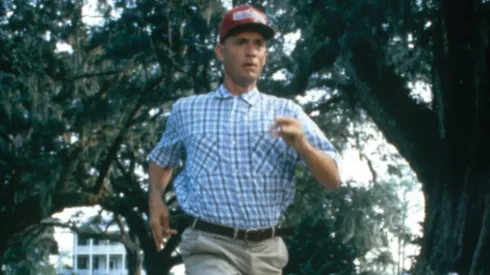A powerful ending can transform a good movie into an unforgettable one. The right conclusion can elevate an entire story. While opinions in cinema often vary, there are some endings that achieve near-universal acclaim for how they resonate long after the credits roll.
Spoilers ahead!
Inception (2010)
Rather than offering a clean resolution, Inception chooses to challenge the audience’s perception of reality. The film centers on Dom Cobb, (played by Leonardo Di Caprio) a professional thief who specializes in stealing secrets through shared dreams. When given a chance to return to his family by planting an idea instead of stealing one, Cobb dives deep into layered dreamscapes where time, memory, and truth become fluid. The final image is deceptively simple: a spinning top, the device Cobb uses to test whether he is awake.
Forrest Gump (1994)
In Forrest Gump, Tom Hanks portrays a man with a kind heart and a low IQ, who unwittingly influences major events in American history through his sheer decency and perseverance. The film ends on a quiet, poignant note as Forrest sends his young son off to school, sitting on the same bench where his own journey began. The understated, emotional farewell underscores the beauty of simple love and the unplanned paths that define a life well-lived.
The Shawshank Redemption (1994)
Frank Darabont’s The Shawshank Redemption tells the story of Andy Dufresne, a banker wrongfully imprisoned for murder, who spends two decades in Shawshank State Penitentiary. Patient and quietly clever, Andy forms a deep friendship with fellow inmate Red while secretly plotting his escape. The film’s ending, (SPOILER!) revealing Andy’s meticulously executed breakout and his peaceful seaside reunion with Red, provides one of cinema’s most satisfying conclusions.
The Lord of the Rings: The Return of the King (2003)
The epic finale to Peter Jackson’s Lord of the Rings trilogy closes out Frodo’s perilous quest to destroy the One Ring. After countless battles, losses, and sacrifices, the ring is finally destroyed in Mount Doom. But the film goes further, offering a layered conclusion that explores the aftermath of war, Frodo’s emotional scars, and the bittersweet departure to the Undying Lands. It’s a masterclass in emotional storytelling that honors Tolkien’s vision while giving fans a deeply moving farewell.
The Sixth Sense (1999)
M. Night Shyamalan’s breakthrough thriller The Sixth Sense follows child psychologist Malcolm Crowe as he helps a young boy, Cole, who claims to see dead people. The ending -SPOILER-, revealing that Crowe himself has been dead the entire time, reframes the entire film in a single moment of revelation. The twist is executed with such subtlety and care that it not only surprises but also enriches the story, making it one of the most universally praised endings in cinema.
The Godfather (1972)
Francis Ford Coppola’s The Godfather is a masterclass in storytelling, chronicling the transformation of Michael Corleone from reluctant outsider to ruthless mafia don. After orchestrating a chilling series of executions to secure his power, Michael’s ascent is finalized in the film’s final scene. As his wife Kay watches, the door to his office slowly closes, separating her from the brutal truth she can no longer deny. That simple shot, loaded with symbolism, marked the perfect end to a story about power, deception, and the cost of loyalty.
The Truman Show (1998)
Jim Carrey stars as Truman Burbank, a man whose entire life has been broadcast as a reality TV show without his knowledge. As Truman gradually uncovers the truth, the audience follows his psychological unraveling and growing desire for autonomy. The film’s final scene where Truman chooses to walk through the door and leave his artificial world behind is a triumphant declaration of free will.
Interstellar (2014)
The list features a notable number of films directed by Christopher Nolan. Interstellar follows Cooper, a former NASA pilot who joins a mission through a wormhole to find a new home for humanity as Earth faces environmental collapse. After a series of time-altering journeys and sacrifices, Cooper ends up inside a tesseract, where he is able to communicate with his daughter Murph across time. The ending brings Cooper back to a future space station named after Murph, now an old woman who has saved humanity using the knowledge he helped transmit. Rather than staying, Cooper sets out again to find Brand, his fellow astronaut, choosing connection over comfort.
Citizen Kane (1941)
Few endings have sparked as much discussion and analysis as the final moments of Citizen Kane. The film follows the life and legacy of Charles Foster Kane, a powerful newspaper magnate whose final word, “Rosebud”, sets off a journalistic quest to uncover its meaning. As reporters interview those who knew Kane, they piece together a portrait of ambition, loneliness, and loss. Yet it is only in the closing scene that the audience sees the answer: a childhood sled, burned in a furnace, bearing the name “Rosebud.”
Cinema Paradiso (1988)
Cinema Paradiso is a heartfelt tribute to the magic of movies and the bittersweet passage of time. The story follows Salvatore, a young boy in a small Italian village, who finds friendship and mentorship in Alfredo, the projectionist at the local theater. After leaving to pursue a career in film, Salvatore returns home years later upon Alfredo’s death. In the final scene, he is left with a reel of film Alfredo had compiled.
